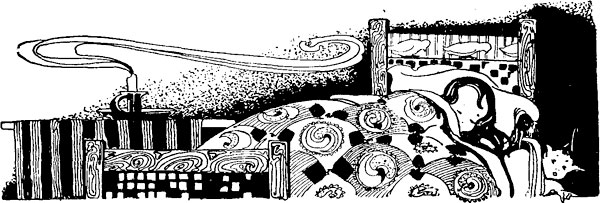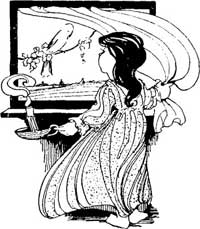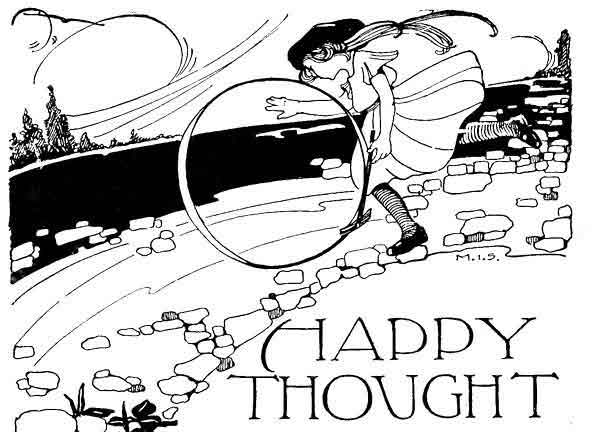On this Saturday, September 5, 2020, we fast approach the end of another summer. The weather remains temperate here in New York, the days are slowly shortening. While looking for a topic for a short Saturday post to follow my long piece on the end of the Western Roman Empire, I came across a charming children’s poem by Robert Louis Stevenson that captures the shift from long days to short, and short days to long. Below, you will find Stevenson’s “Bed in Summer,” my thoughts on the poem, and a second Stevenson poem to conclude the post.
Robert Louis Stevenson’s “Bed in Summer”
The following poem, “Bed in Summer,” is reprinted from the 1916 edition of “A Child’s Garden of Verses” by Stevenson, and illustrated by Myrtle Sheldon. I have included the illustrations by Sheldon, below, along with the poem.

Bed in Summer (Robert Louis Stevenson)
In Winter I get up at night And dress by yellow candle light. In summer quite the other way, I have to go to bed by day. I have to go to bed and see The birds still hopping on the tree, Or hear the grown-up people's feet Still going past me in the street. And does it not seem hard to you When the sky is clear and blue, And I should like so much to play, To have to go to bed by day?
Thoughts on Long Days and Early Nights for Children and Adults
“End of Summer” charmingly captures the feelings of a child who does not much enjoy going to bed when the sky is still blue, a uniquely summer problem. For many adults holding down jobs, I think that the concern might run “quite the other way.” Those who commute to work and work indoors face the somewhat unpalatable prospect of only venturing outdoors when it is dark, dressing for work “by yellow candle light” and beginning the commute home when the sky is darkened by the impending night.
A Brief Anecdote
These days, I avoid the light issue almost entirely by working from home, which allows me to go out and take a walk in the morning, afternoon, and/or evening. Back in college, I was generally good at crafting a schedule that packed all my classes close together, such that I did not have long breaks without much to do on campus. However, for one semester, this led to my final class ending just after 5:00 PM. Since this was the fall semester, I distinctly recall that the sky would be dark by the time I started my commute home. It was a bit dreary.
The Emu Café Mindset and the End of Summer
How does one, whether child or adult, guard against seasonal malaise? In the midst of spring, I wrote the following in describing The New Leaf Journal’s very own Emu Café:
“The traits of the seasons are most crisp in the refreshing mornings. Hours pass slowly, like a reverie, in the bold colors of the afternoon. Lovers of elegance and wisdom are all in accord that the Moon, embroidered in the starlight curtains, as seen through The Emu Café’s window, is indeed beautiful.”
From Welcome to the Emu Café
While special appreciation of the seasons is a fixture on The Emu Café menu, the spirit of our fine establishment is portable. It may be dreary to “dress by yellow candle light,” but there’s something unique about the air on a late autumn or winter morning. As I suggest, the traits of the seasons are most readily discerned in the early morning hours as the sun awakes. While a commute in daylight may be more pleasant, there is plenty to appreciate in the fresh, sometimes biting, breeze of a darker and cooler morning.
The child with an early bedtime may take no issue with the early nights during the colder months. The adult who must work and commute, however, may find the early nights depressing. But here too, there is something unique to appreciate. The clean yellows of spring, warm yellows of summer, and soft orange of early autumn are traded for something with less color, but no less warm if properly appreciated. The dark afternoons of winter have some of the charm of a fine black and white photograph, with all the sharp contrasts entailed.
The Bed in Summer Children’s Menu at The Emu Café
The children like the one described in “Bed in Summer” will not have to worry about going to bed while the Sun is high for much longer. But if they still have an early bedtime next summer, they ought to consider appreciating the unique traits of repose during the day. The sun is not only good for running around, but also for rest and contemplation. In any case, the children will be forced to appreciate rest and contemplation when they eventually break the shackles of their bedtimes and start staying up until the strange hours, the morn-night as Victor and I referred to it back in school.

Concluding With Robert Louis Stevenson’s “A Happy Thought”
Lest I ramble further, allow me to conclude with a second poem from the Robert Louis Stevenson compilation. Although I am confident that he was not thinking primarily of the distinct qualities of the seasons in writing it, its broad sentiment reaches those qualities that I touched upon briefly above. The poem is again reprinted from “A Child’s Garden of Verses,” and accompanied by the book’s illustrations, drawn by Myrtle Sheldon.

Happy Thought (Robert Louis Stevenson)
The world is so full of a number of things, I'm sure we should all be happy as kings.